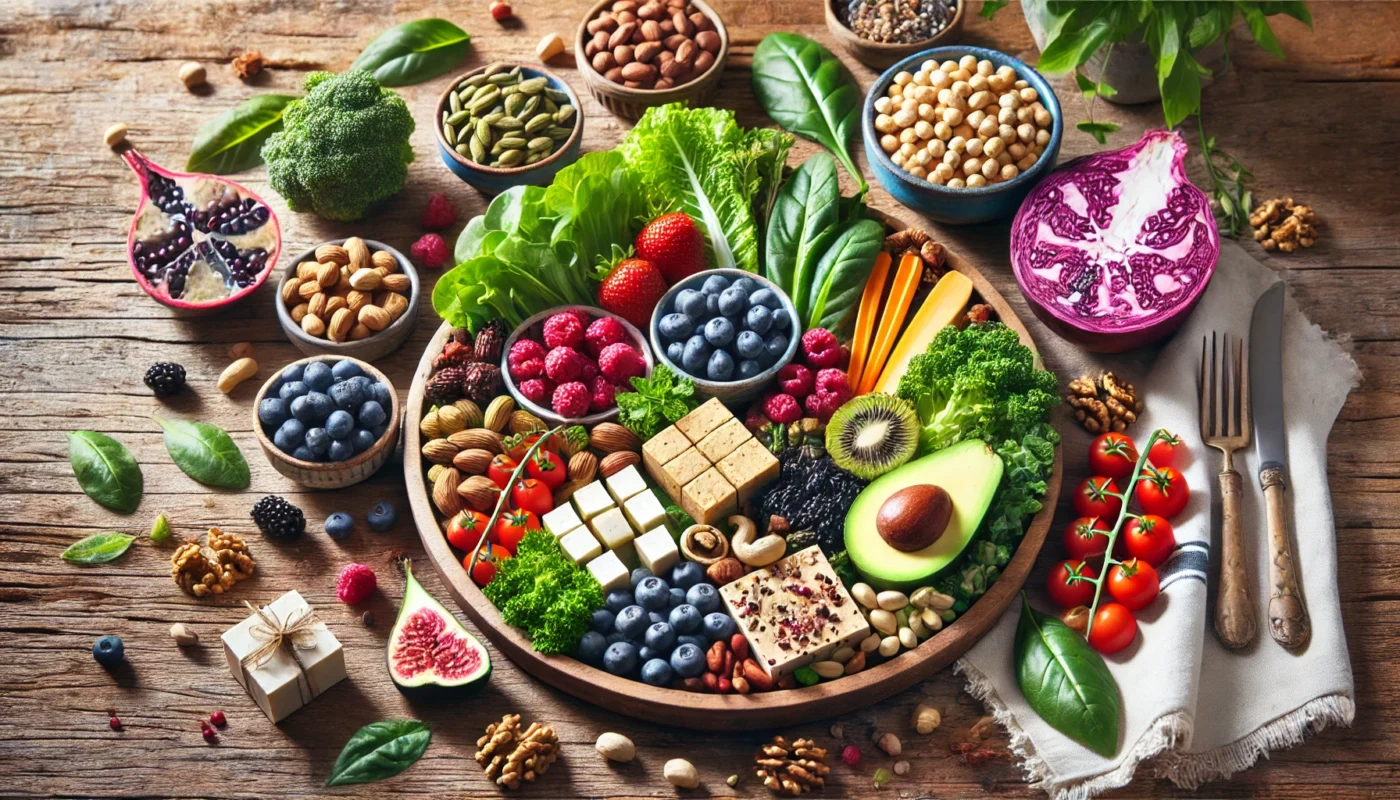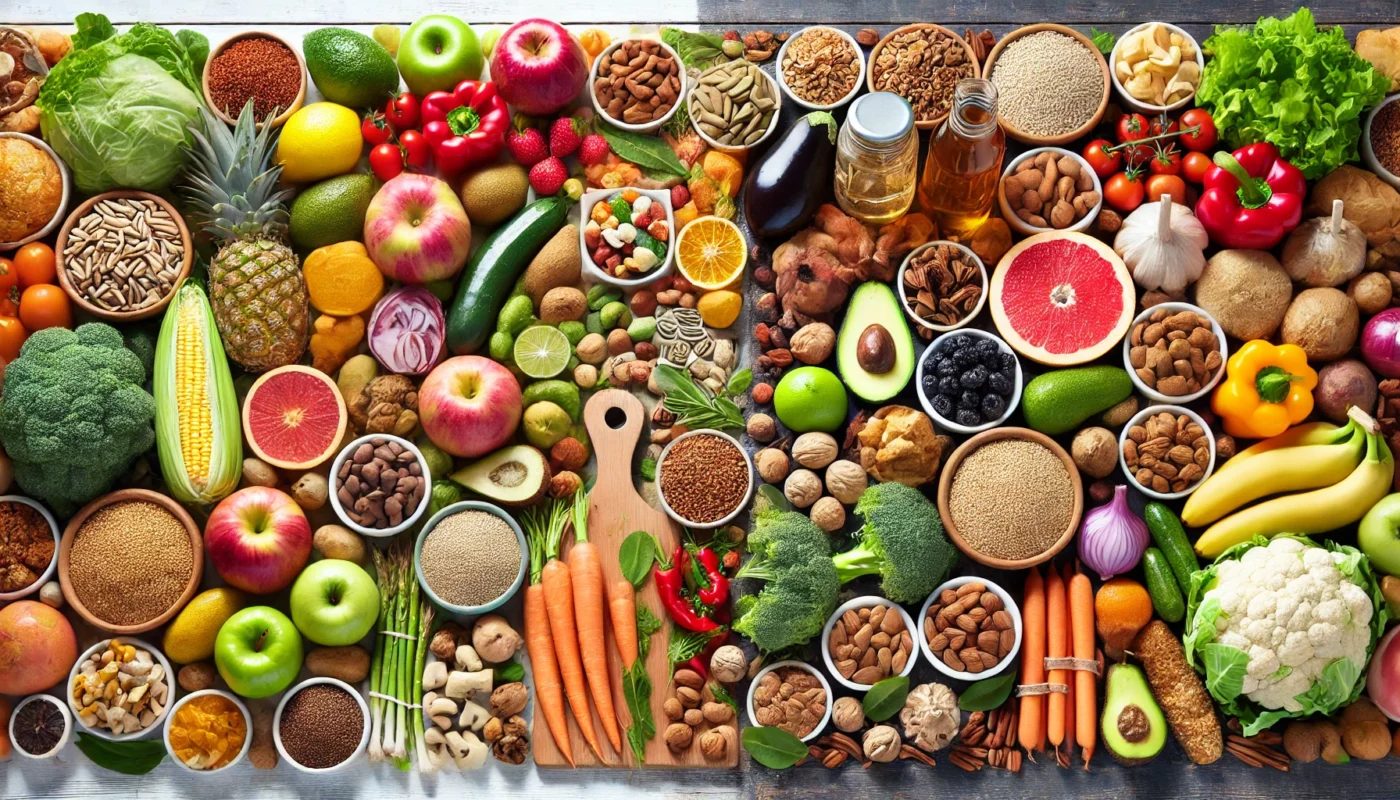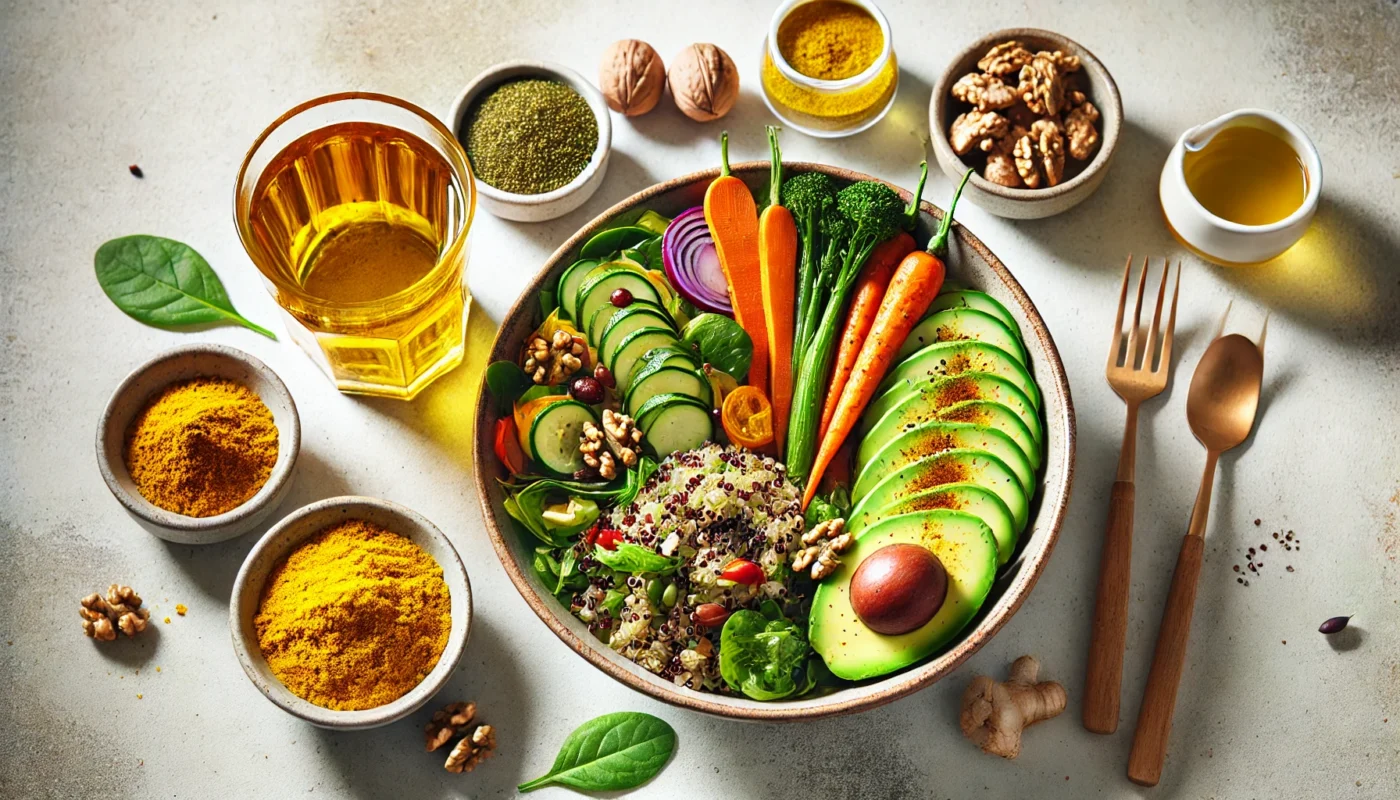In the quest for optimal health and wellness, dietary choices play a pivotal role. For those inclined towards holistic and alternative health approaches, adopting an anti-inflammatory vegan diet can offer numerous benefits. This dietary pattern not only emphasizes plant-based foods but also aims to reduce inflammation, a contributing factor in many chronic diseases. Let’s delve into the advantages of this dietary lifestyle and explore how it can enhance your overall well-being.
You May Also Like: Exploring the Irish Autoimmune Diet Benefits
Understanding Inflammation and Its Impact
Inflammation is a natural response by the body’s immune system to protect against infection and injury. However, chronic inflammation can lead to a myriad of health issues, including heart disease, diabetes, and certain cancers. By focusing on an anti-inflammatory vegan diet, you can potentially reduce inflammation and promote better health outcomes.
The Role of Inflammation in Chronic Diseases
Chronic inflammation is like a slow-burning fire within the body, gradually damaging tissues and organs. It can be triggered by lifestyle factors such as poor diet, stress, and lack of exercise. Over time, this persistent inflammation can lead to the development of chronic diseases, significantly impacting quality of life. By addressing inflammation through diet, we can potentially prevent or mitigate these health issues.
How Diet Influences Inflammation
The foods we consume can either fuel inflammation or help to extinguish it. Diets high in processed foods, sugars, and trans fats are known to promote inflammation. Conversely, diets rich in natural, plant-based foods are associated with reduced inflammatory markers. The anti-inflammatory vegan diet emphasizes foods that contain beneficial compounds to counteract inflammation, supporting overall health.
The Immune System’s Connection to Inflammation
The immune system is intricately linked to inflammation, as it’s the body’s defense mechanism. When functioning correctly, it fights off infections and repairs damaged tissues. However, an overactive immune response can lead to chronic inflammation. A vegan diet abundant in fruits and vegetables can modulate immune responses, ensuring they are effective without becoming excessive.
The Science Behind Anti-Inflammatory Foods
Research underscores the significance of specific nutrients and compounds found in plant-based foods that combat inflammation. These include antioxidants, polyphenols, and omega-3 fatty acids. Such nutrients are abundant in fruits, vegetables, whole grains, nuts, and seeds, which form the cornerstone of a vegan diet.
Antioxidants: The Body’s Defense Against Oxidative Stress
Antioxidants are powerful compounds that neutralize free radicals, preventing oxidative stress and subsequent inflammation. Foods like berries, dark leafy greens, and nuts are rich in antioxidants, which can help repair cellular damage and reduce the risk of chronic diseases. A diet high in these foods can help maintain cellular integrity and promote longevity.
Polyphenols: Nature’s Anti-Inflammatory Agents
Polyphenols are plant compounds with potent anti-inflammatory effects. Found in foods such as tea, coffee, and colorful fruits, they play a role in reducing inflammation and improving heart health. Regular consumption of polyphenol-rich foods has been linked to lower incidences of cardiovascular diseases and improved metabolic health.
Omega-3 Fatty Acids: Essential Fats with Healing Powers
Omega-3 fatty acids, found in flaxseeds, chia seeds, and walnuts, are essential for reducing inflammation. They play a crucial role in brain health, cardiovascular function, and joint health. Incorporating these healthy fats into a vegan diet can help balance the body’s inflammatory response and support overall well-being.

Key Benefits of a Vegan Diet
Adopting a vegan diet offers several advantages, particularly when tailored to be anti-inflammatory. Let’s explore these benefits in detail:
Enhanced Cardiovascular Health
A vegan diet, rich in fruits and vegetables, is inherently low in saturated fats and cholesterol. Studies have shown that individuals following a plant-based diet often have lower blood pressure, reduced cholesterol levels, and a lower risk of heart disease. The anti-inflammatory properties of certain foods, such as leafy greens and berries, further support cardiovascular health.
Improved Circulatory Function
The high fiber content and absence of cholesterol in a vegan diet promote better blood circulation. Improved circulation reduces the risk of atherosclerosis, a condition where arteries become clogged. By keeping blood vessels clear, a vegan diet helps maintain a healthy heart and efficient circulatory system.
Lower Risk of Stroke and Heart Attack
Research indicates that plant-based diets can significantly lower the risk of stroke and heart attack. This is attributed to the diet’s ability to lower blood pressure and improve lipid profiles. Consuming a variety of fruits, vegetables, and whole grains ensures a steady supply of nutrients that protect heart health.
Improved Digestive Health
Fiber is a vital component of a vegan diet, promoting healthy digestion and regular bowel movements. High-fiber foods, like legumes and whole grains, not only aid digestion but also serve as prebiotics, fostering a healthy gut microbiome. This can reduce inflammation within the digestive tract and enhance nutrient absorption.
Enhanced Gut Microbiota Diversity
A diverse gut microbiota is crucial for optimal digestive health. Plant-based diets are rich in prebiotics, which feed beneficial gut bacteria. A healthy gut microbiome not only aids digestion but also strengthens the immune system and reduces inflammation.
Reduction in Digestive Disorders
Many digestive disorders, such as IBS and constipation, are linked to inflammation. An anti-inflammatory vegan diet can alleviate symptoms by promoting a balanced gut environment. Regular intake of fiber-rich foods helps maintain regular bowel movements and reduces gastrointestinal discomfort.
Weight Management and Metabolic Health
Plant-based diets are typically lower in calories and high in nutrients, making them effective for weight management. By naturally reducing calorie intake while maintaining nutrient density, an anti-inflammatory vegan diet can support metabolic health and help prevent obesity-related conditions.
Stabilizing Blood Sugar Levels
A vegan diet can help stabilize blood sugar levels, reducing the risk of type 2 diabetes. Foods rich in fiber slow down sugar absorption, preventing spikes in blood glucose. Consistent blood sugar control supports metabolic health and reduces inflammation.
Reducing the Risk of Obesity
Obesity is a significant risk factor for many chronic diseases. A vegan diet, with its emphasis on whole foods, helps prevent excess weight gain. The combination of low-calorie density and high nutritional value supports a healthy weight and reduces inflammation.
Strengthened Immune System
Fruits and vegetables are packed with vitamins, minerals, and antioxidants that bolster immune function. An anti-inflammatory vegan diet supplies the body with essential nutrients needed to fight off infections and reduce the risk of chronic diseases linked to inflammation.
Vitamin C and Immunity
Vitamin C is abundant in many fruits and plays a vital role in immune function. It stimulates the production of white blood cells, enhancing the body’s ability to fight infections. Regular consumption of vitamin C-rich foods is essential for a robust immune system.
Phytonutrients and Immune Support
Phytonutrients found in plant-based foods offer additional immune support. These compounds help regulate immune responses and reduce inflammation. Including a variety of colorful fruits and vegetables in the diet ensures a comprehensive range of phytonutrients.
Reducing Inflammation-Related Illnesses
By minimizing inflammation, a vegan diet reduces the risk of illnesses linked to chronic inflammation. This includes autoimmune diseases and certain types of cancer. A diet rich in anti-inflammatory foods strengthens the body’s defenses against these conditions.

Practical Tips for Adopting an Anti-Inflammatory Vegan Diet
Transitioning to this dietary approach requires thoughtful planning to ensure nutritional adequacy. Here are some strategies to consider:
Prioritize Whole Foods
Focus on whole, unprocessed foods to maximize nutrient intake. Fresh fruits, vegetables, whole grains, nuts, and seeds should be the mainstay of your diet. Avoid processed vegan foods, which may contain inflammatory additives and lack essential nutrients.
Benefits of Whole Foods Over Processed Alternatives
Whole foods provide a wealth of nutrients and reduce exposure to harmful additives. They are less likely to contribute to inflammation compared to processed alternatives. Emphasizing whole foods ensures nutrient density and supports overall health.
Creative Meal Planning with Whole Foods
Explore diverse recipes that highlight whole foods to keep your diet exciting. Experimenting with different cuisines can introduce new flavors and textures. Meal planning helps maintain variety and ensures you meet your nutritional needs.
Include a Variety of Plant-Based Proteins
Diversify your protein sources to ensure you’re obtaining all essential amino acids. Incorporate legumes, tofu, tempeh, and quinoa into your meals. These foods are not only rich in protein but also offer anti-inflammatory benefits.
Exploring Alternative Protein Sources
Plant-based proteins offer a variety of flavors and textures. Try incorporating lentils, chickpeas, and edamame into your meals. Diversifying your protein intake ensures a balanced diet and reduces the risk of nutrient deficiencies.
Balancing Protein Intake Throughout the Day
Spread your protein intake evenly across meals to support muscle maintenance and repair. This approach helps sustain energy levels and promotes satiety. Planning protein-rich snacks can also prevent hunger and keep inflammation at bay.
Embrace Healthy Fats
Omega-3 fatty acids are crucial in an anti-inflammatory diet. Include sources such as flaxseeds, chia seeds, and walnuts. These healthy fats can help reduce inflammation and support heart and brain health.
The Role of Omega-3s in Reducing Inflammation
Omega-3 fatty acids are known for their ability to reduce inflammation. They play a crucial role in maintaining heart health and supporting cognitive function. Regular consumption of omega-3-rich foods is essential for an anti-inflammatory diet.
Incorporating Healthy Fats into Daily Meals
Add flaxseeds to smoothies, sprinkle chia seeds on yogurt, and use walnut oil in salad dressings. These simple additions enhance the nutritional profile of meals. Incorporating healthy fats is a delicious way to support overall health.
Spice Up Your Meals
Certain spices, like turmeric and ginger, possess potent anti-inflammatory properties. Incorporate these spices into your cooking to enhance flavor and harness their health benefits.
Culinary Uses of Anti-Inflammatory Spices
Spices like turmeric and ginger can be used in a variety of dishes. Turmeric pairs well with curries and soups, while ginger adds a zing to stir-fries and teas. These spices not only enhance flavor but also offer significant health benefits.
Experimenting with New Spices
Explore other anti-inflammatory spices such as cinnamon, cayenne, and garlic. These spices add depth to dishes and contribute to the diet’s anti-inflammatory effects. Experimenting with different spices can lead to exciting culinary discoveries.

Addressing Common Concerns
While an anti-inflammatory vegan diet offers numerous advantages, some individuals may have concerns about nutrient deficiencies. Here’s how to address common worries:
Ensuring Adequate Vitamin B12
Vitamin B12 is essential for nerve function and the production of red blood cells. Since it is primarily found in animal products, vegans should consider fortified foods or supplements to meet their needs.
Sources of Vitamin B12 for Vegans
Fortified cereals, plant-based milks, and nutritional yeast are excellent sources of B12. Incorporating these foods can help meet daily requirements. Regular monitoring of B12 levels ensures adequate intake and prevents deficiency.
Importance of B12 Supplementation
In some cases, supplementation may be necessary to maintain optimal B12 levels. This is particularly important for long-term vegans. Consulting with a healthcare provider can guide appropriate supplementation.
Maintaining Bone Health
Calcium and vitamin D are critical for bone health. Incorporate fortified plant-based milks, leafy greens, and consider vitamin D supplements, especially if you have limited sun exposure.
Calcium-Rich Plant Foods
Leafy greens, almonds, and fortified tofu are excellent sources of calcium. Including these foods in your diet supports bone health. Regular consumption of calcium-rich foods is crucial for maintaining strong bones.
The Role of Vitamin D in Bone Health
Vitamin D aids in calcium absorption and is vital for bone strength. Sun exposure and fortified foods are key sources of vitamin D. In areas with limited sunlight, supplements may be necessary to meet daily requirements.
Balancing Iron Intake
Plant-based iron is less readily absorbed than animal-derived iron. To enhance absorption, pair iron-rich foods like lentils and spinach with vitamin C-rich foods such as citrus fruits and bell peppers.
Enhancing Iron Absorption
Combining iron-rich foods with vitamin C sources significantly boosts iron absorption. This simple dietary tweak can prevent iron deficiency. Planning meals with complementary foods ensures optimal nutrient absorption.
Monitoring Iron Levels
Regular blood tests can help monitor iron levels and prevent deficiency. Awareness of symptoms like fatigue and weakness can prompt early intervention. Consulting with a healthcare provider ensures effective management of iron intake.
Conclusion
Adopting an anti-inflammatory vegan diet can be a transformative step towards improved health and well-being. By focusing on nutrient-rich, plant-based foods and minimizing inflammation, you can support your body’s natural healing processes and reduce the risk of chronic diseases. Embrace this dietary approach as a holistic strategy for health, and enjoy the myriad benefits it has to offer.
The Holistic Approach to Health
An anti-inflammatory vegan diet is not just about food; it’s a lifestyle change. It encourages mindfulness in food choices and promotes overall well-being. This holistic approach integrates physical health with emotional and mental wellness.
Long-Term Benefits and Sustainability
The benefits of this diet extend beyond immediate health improvements. Long-term adherence can lead to sustained energy levels, improved mental clarity, and enhanced quality of life. The focus on sustainability supports both personal health and environmental well-being.
Empowering Yourself Through Diet
Taking control of your diet empowers you to take charge of your health. With knowledge and practical strategies, you can make informed choices that align with your wellness goals. An anti-inflammatory vegan diet is a powerful tool for achieving lasting vitality.
By understanding the science and implementing practical strategies, you can effectively harness the power of an anti-inflammatory vegan diet to enhance your health and vitality.
Further Reading:
Anti-inflammatory diet: What to know
Anti-inflammatory meal plan: 26 recipes to try
Anti-Inflammatory Vegan Meal Plan, Created by a Dietitian
anti-inflammatory diet, vegan diet, healthy fats, omega-3 fatty acids, muscle maintenance, nutrient deficiencies, vitamin B12, bone health, iron absorption, plant-based nutrition, wellness, chronic disease prevention, holistic health, sustainable diet, healthy eating, inflammation reduction
Important Note: The information contained in this article is for general informational purposes only, and should not be construed as health or medical advice, nor is it intended to diagnose, prevent, treat, or cure any disease or health condition. Before embarking on any diet, fitness regimen, or program of nutritional supplementation, it is advisable to consult your healthcare professional in order to determine its safety and probable efficacy in terms of your individual state of health.
Regarding Nutritional Supplements Or Other Non-Prescription Health Products: If any nutritional supplements or other non-prescription health products are mentioned in the foregoing article, any claims or statements made about them have not been evaluated by the U.S. Food and Drug Administration, and such nutritional supplements or other health products are not intended to diagnose, treat, cure, or prevent any disease.

